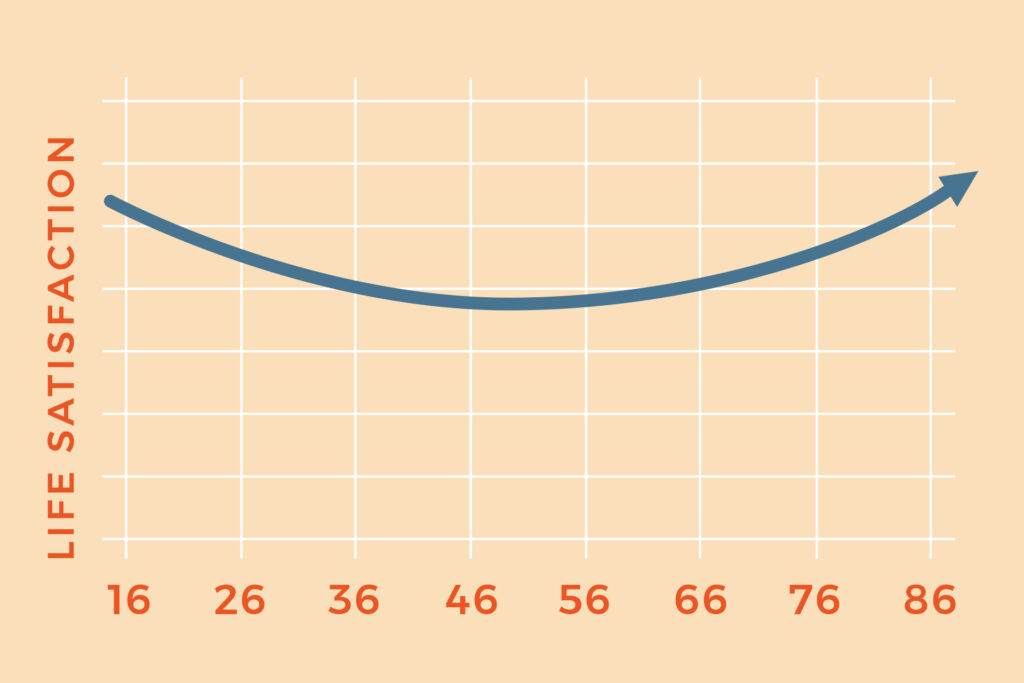We have an outdated understanding of our life stages, according to The Happiness Curve author Jonathan Rauch. Most of us think we grow and learn during childhood and adolescence, enjoy our twenties and thirties, experience a midlife crisis in our forties, and then begin a slow decline during our fifties and beyond.
In reality, new research tells us that happiness throughout our lives looks much like a smile—or “U-shape,” as Rauch likes to call it. Life satisfaction tends to fall in our twenties and thirties, hit a trough in our late forties, and start to increase in our fifties. In short, there’s a lot to look forward to in the second chapter of your life.
Wisdom@Work author Chip Conley latched on to this research soon after he started consulting with Airbnb, where everyone else was half his age and called him the “wise elder” at 52 years old. While he winced the first time he heard the phrase, he later came to appreciate its significance when Airbnb’s CEO Brian Chesky said, “Chip, we hired you for your knowledge, but what we really gained was your wisdom…”
Inspired by his renewed purpose and valued contributions during this new season in his life, Conley realized that people in their midlives needed to reboot and recharge. He started the Modern Elder Academy, a social enterprise dedicated to helping people through the midlife transition and redefining the aging mindset.
I heard Conley speak at a recent conference, and he shared seven lessons for finding purpose in the second chapter of your life. I found them incredibly inspiring and wanted to share them with you.
Each one links directly to your happiness, which is central to your effectiveness and fulfillment at work and in life. If you want to know more about how your inner peace connects with your outer impact on others, check out this post.
Conley’s Seven Lessons for Finding Purpose Later in Life:
- Take a pitstop: It’s critical to take a midlife pitstop so we can consciously curate the next phase of our lives, which statistically is about fifty-four years old.
- Establish rituals: Midlife deserves rituals. We have no operating manual to move from our ego to what our soul longs for; we need a new operating system to bring about alignment with our soul. Rituals help you gather certainty as you transition from midlife.
- Edit your life: We should consider becoming great editors in our lives, taking inventory of our mindsets, habits, beliefs, energy use—all of it. Listen to this podcast to learn more.
- Become a beginner again: This ensures we stay curious and foster a growth mindset versus a fixed mindset at any age. Try something, anything, new to become a beginner again. Experience being a beginner; it’s about the experience, not the outcome.
- Record your wisdom: Take time to own your wisdom. Write down your key wisdom nuggets each week. Metabolize your wisdom and experiences.
- Spy on the divine: Awe is the path to joy and purpose. Make a point every day to spy on the divine. Take an awe walk and look at everything with a lens of awe. For more on the positive effects of awe and how to do this, read The New Science of Everyday Wonder.
- Build community: We need and deserve community, including at work. We long for deep connection, meaning, and conversations. Work can be the place to provide this if we, as leaders, are willing to trust and make space for it.
With increasing focus on and pressure created by the need for DQ, or digital intelligence, Conley says we can’t forget the need for wisdom in the workplace. Leaders need to revisit the importance of balancing the scales with new and seasoned employees alike. Both have a lot to offer, and Conley’s experience only scratches the surface of what’s possible if leaders are willing to engage employees willing to be both the learner and beginner again.

